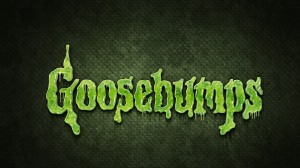Getting me through my politics essay:
Miscellaneous
Posts not necessarily related to Networked Media
Incase You Were Feeling A Bit Small
Castlecomer – Forrest
Just stumbled upon these tunes from Sydney boys, Castlecomer
My First Hypertext
Today hypertext media seems ubiquitous. I’m surrounded my interactive screens all vying to win my incredibly short attention span. However when I try to imagine a hypertext culture without an electronic medium, I struggle. So then I try and remember if I had any kind of hypertextual print when I was a kid, before I became submerged in my screens.
The first thing I settled on was Goosebumps. Now if you were like me and abused your primary school library, not for textbooks or non-fiction research, but rather for the Where’s Wally and the odd HP read when you could get your hands on one – you will definitely remember Goosebumps. They were an awesome series of short, easy to read horror stories and the ones that i read the most were the ‘Chose Your Own Story’ editions. These had an obscene amount of endings an plot twists, and the reader got to decide all of them. Once you finished a chapter you were presented with a series of scenarios; a) Go up the stair of the haunted house b) Check the back yard for your friend c) go back to your car, etc. These wouldn’t just affect the ending but the whole story, the characters you encountered, how your character developed. This was the first time I can remember a book not being restricted by sequence; in one book you would jump back and forwards in pages and the end could be in the middle of the book.
These editions of Goosebumps could be considered hypertextual in the way they are non-sequential. They branch off and allow choices to the reader.
I’ll end on a fun Goosebumps fact: Stine deliberately omitted any kind of drugs, depravity and violence in his books. There are also never any deaths in the stories.
I Dare You To Watch This Entire Video
Attention spans are growing shorter and shorter as the Internet and social media continue to dominate our culture. Lets’ see how it’s affected you; see if you can watch this whole video.
Everything Bad Is Good For You
Steven Johnson is an American popular science author and media theorist. In his book “Everything Bad Is Good For You” (2005), he presents an interesting argument defending modern pop culture, in particular: video games and television.
He argues that, although sometimes violent and sexual, video games stimulate reward centers of the brain and invite exploration and problem solving. Television is a “brilliant medium”, as it exposes how adept a person is in understanding narratives and interpersonal connections (and their AQ: Autism Quotient – higher emotional intelligence=lower AQ). Even reality television shows have merits in the way they display the complexity of social networking in human relations.
Johnson imagines a world where digital media came first and books were invented afterwards. Kids are now starting to read these new ‘books’, and that teachers and parents are worried:
“But perhaps the most dangerous property of these books is the fact that they follow a fixed linear path. You can’t control their narratives in any fashion –– you simply sit back and have the story dictated to you. For those of us raised on interactive narratives, this property may seem astonishing. Why would anyone want to embark on an adventure utterly choreographed by another person? But today’s generation embarks on such adventures millions of times a day. This risks instilling a general passivity in our children, making them feel as though they’re powerless to change their circumstances. Reading is not an active, participatory process; it’s a submissive one. The book readers of the younger generation are learning to ‘follow the plot’ instead of learning to lead.”
Perhaps screen addiction is not as toxic as some would have you believe… Food for thought.
Comedy Critics
A little aways from Networked Media but still relevant to media as a whole.
A great read and some great videos showing how comedy can actually be an important platform for social criticism and in fact comedians can often be the most honest and transparent critics. This article and its attached videos focus mainly on the scientific community and the debates over Climate Change, Vaccination and Evolution.

